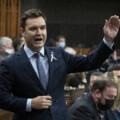
A majority of Canadians think that Canada is broken after years of stagnant incomes, affordability challenges, rising crime, government failures on basic functions like healthcare and immigration, and a deepening cultural malaise. But decline is a choice, and better public policies are needed to overcome Canada’s many challenges. Kickstart Canada brings together leading voices in academia, think tanks, and business to lay out an optimistic vision for Canada’s future, providing the policy ideas that governments need to ensure a bright future for all Canadians.
The stars are finally aligning to make Canada the best place in the world to give and receive care. In the last budget, the federal government made an unprecedented commitment to a National Caregiving Strategy. This is the first time that a federal government of any stripe has recognized the need for policy reform to address the crisis in care.
Now that we have a commitment, it is time to move to real, concrete action to ease the many pressures that caregivers and care providers face every day.
Caregivers are the people caring for aging parents, children with disabilities, sick friends, neighbours, or chosen family. They care for people in their lives out of love, dedication, necessity, and sometimes out of duty. Care providers are skilled professionals who support others for a living, such as personal support workers, home care aides, or direct support professionals caring for our senior population, people with disabilities of all ages, and those facing illness in their homes or in other settings.
Care is the backbone of Canadian society. You are likely a caregiver already. If not, you certainly know someone who is caring for someone in their life. One in four Canadians is a caregiver today, and half of us will be a caregiver at some point in our lives.
Caregivers and paid care providers are essential to our daily lives. They provide three hours of care for every hour provided by the health-care system. Many caregivers work an “extra shift,” juggling their jobs with an average of 30 hours of care responsibilities per week. The lost economic productivity due to care responsibilities is estimated at $1.3 billion annually. Paid care providers support the people we love in some of their most difficult times of life and make it possible for millions of people to live their lives and earn a living.
The problem is not the act of giving or receiving care. Rather, the problem is that caregivers and care providers are insufficiently supported by meaningful public policy that addresses their needs. Caregivers ensure that medical directives are being followed and people with disabilities of all ages, our senior population, and those facing illness can stay at home. Current strains on health and social services systems in every province and territory across the country mean that we desperately need caregivers and care providers to keep going. Without them, our health and social care systems would crumble.
A report by the Canadian Centre for Caregiving Excellence (CCCE), titled “Caring in Canada,” found that caregivers need help. Nearly half of caregivers (47 percent) reported feeling tired or overwhelmed because of their care responsibilities. One in four caregivers reported fair or poor mental health and one in five say their physical health has suffered. The correlation under these statistics is clear: the more care you provide, the worse your mental and physical health becomes.
The same report shows that caregiver finances are under significant strain. Half of caregivers have experienced financial stress in the past year related to caring for others, and about 20 percent of all caregivers earn less than $20,000 per year. At the same time, more than one in five caregivers reported spending at least $1000 out of pocket per month related to their care responsibilities. This is a lot to ask of people alongside record grocery prices, rent, and interest rates.
The care provider workforce—predominantly comprised of racialized women, many from overseas—do high-skilled and back-breaking jobs supporting people during their most vulnerable hours. The above study found that one in four care providers do not feel safe at work. About the same proportion say they have experienced discrimination or abuse at work. Only 25 percent of care providers feel supported by our governments. Considering these figures, it is unsurprising that a staggering 80 percent have considered changing careers.
The difficulties that caregivers and care providers face every day remain unrecognized and unsupported. With an aging population and rising rates of disability and mental health conditions, the increased need for better care in the coming years is becoming more and more obvious by the day. The National Caregiving Strategy is a once-in-a-generation opportunity to meaningfully address these issues. But how?

Yvonne Yorke helps her stepdad Neville Williams in Toronto, Friday, Jan. 7, 2022. Cole Burston/The Canadian Press.
Policy solutions to create a better future for care
Policy solutions can address many of these issues and make Canada the best place in the world to give and receive care. These include:
- Make the Canada Caregiver Credit refundable and review the Disability Tax Credit, Registered Disability Saving Plan, and medical expense income tax allowances to make them work better for caregivers and recipients of care.
- Reduce the financial burden of care by implementing a caregiver benefit to put much-needed money in the pocket of caregivers, modeled in places such as Nova Scotia, Prince Edward Island, and the United Kingdom.
- Develop caregiver-friendly workplace policies and employment protections, starting with the federally regulated portions of the economy.
- Improve caregiver-specific leaves and benefits available through the Employment Insurance system.
- Fix the rules governing the Canada Pension Plan to ensure caregivers are not punished for taking years out of the workforce to provide care. Women are more likely to interrupt their careers or leave the workforce entirely to give care, impacting their ability to retire and overall financial security into their senior years.
- Use future federal-provincial health accords to increase funding for home and community care and better integrated systems of care that will make home-care services more accessible for senior caregivers.
- Implement the federal commitment to a $25 minimum hourly wage for personal support workers and expand the commitment to the rest of the frontline care provider workforce to retain and attract more people to the sector.
Towards a national caregiving strategy
CCCE began a national conversation on care before the federal government made its historic commitment to developing a National Caregiving Strategy in April 2024. Through extensive dialogue with caregivers, care providers, organizations, and experts from coast to coast to coast, CCCE has been developing concrete policy proposals to help Canadians supporting people they love.
The overwhelming message from the dozens of formal and informal consultations CCCE has convened is clear—it is time to take serious action to support caregivers and care providers. The future we all deserve is at stake.
When the stars are aligned, they are easier to see in the night sky. The budget commitment to a National Caregiving Strategy is the best hope for real change for the millions of Canadians who care for others. The federal government must seize the moment they have created and introduce bold and decisive change.







